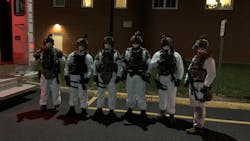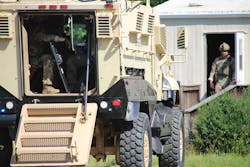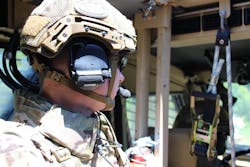The Importance of Medical Personnel for SWAT Teams
In the November 2021 issue of OFFICER Magazine, we published a “SWAT Spotlight” article featuring the Spotsylvania County (VA) Sheriff’s Office’s Special Operations Team (the article can be found here: Officer.com/21242530). During the interviews conducted for that article, we learned that the team leadership felt there might be insufficient personnel trained to provide emergency trauma/medical care. It is common for a team, in the midst of an interview, to voice a concern about a perceived shortcoming or lack of personnel/skill set for the team. After all, every team wants to have every capability imaginable. Unfortunately, budgets and manpower limitations are a reality. And when you have deputies tasked to perform other duties as their primary and assignment to the SWAT team is a part-time task, it becomes even more challenging to get one into training. Remember this: When you take one deputy out of a position for training, someone else has to fill that position for whatever amount of time. The effect can build and putting one person in training can affect four or five others. In agencies where manpower is already short, attending anything other than mandatory training can become quite the challenge.
That’s why, when we followed up with the Spotsylvania County SWAT team, we were surprised to learn that they had drastically changed their emergency trauma/medical care capabilities in just the three months between the original interview and the follow up. Having identified the concern though, the team approached the sheriff and he understood immediately.
The first step was to take a tactical medical qualified deputy and assign him to the SWAT team. That resolved the immediate concern of not having a medic deployed when the team had to go on assignment or call out. Beyond that, the next question was, “What else would be good for the team?” Not what did they want; not what else was mandatory - but a balance between. After some research and discussion along with input from the medic on the team the team did, and continues to do, three things:First, they responded to a local doctor who had asked about supporting the team/sheriff’s office. He had previously been involved in high-risk operations in a support role and the sheriff’s office was happy to accept him in the same way. That doctor was added into the training rotations for medics and training when he was available. The idea was to get him up to speed on where he fit and what his duties would be (and when) if something went sideways. That greatly helped to address immediate emergency medical treatment.
Second, they found a local sports doctor/chiropractor and got him to come on board to assist the SWAT team members, and the rest of the agency, in managing performance health. What is “performance health?” When you think of SWAT officers as athletes, and certainly they have to be physically fit to a level found in elite athletes, then you can understand that they need support for healing injuries, avoiding injuries and increasing their performance levels. Just like every professional sports team has a doctor (or several), every SWAT team should have access to a sports doctor; a properly qualified doctor to assist them with any challenges faced. It’s unfortunately common for SWAT members to get injured on callouts. No matter how minor that injury may seem, it can develop into a long-lasting problem. The sports doctor can not only help minimize the impact of the injury but advise the officer on how to come out of it even stronger.
Third, the sheriff’s office started sending team members, as manpower allowed, to SWAT Medic school. The week-long program is offered local to them and the commercial organization that delivers the training (Commonwealth Criminal Justice Academy—ccjatraining.com) has a long history of training special operations emergency medical care.
A member of our editorial staff was invited to attend the training but could only get there to observe on one of the days. On that particular day, the course work involved proper tourniquet staging and application. Several different tourniquets and the pros and cons of each were discussed, displayed and demonstrated. Also discussed, and demonstrated—as well as practiced by the attending personnel - was intubation with a variety of tools commonly available to emergency medical technicians.
Further discussed was potential abdominal wounds and what parts of the body would be injured (our editorial director will never forget the drawing of the quartered abdomen and the acronym GLASS: gall bladder, liver, appendix, stomach, spleen). Blood loss, shock, the absolute need to maintain body temperature in a trauma victim and more were all part of the presentation that day.It was interesting to observe the course and see two SWAT officers from Spotsylvania County in attendance along with the doctor who was supporting the team and the sports doctor/chiropractor there as well. The instructor’s professionalism and discourse with the two doctors in the room along with the students, one of whom was a veterinarian who is also a competitive shooter and wanted to be better prepared if something went sideways at a competition.
When you take into consideration all the potential applications—in any setting at the least expected of times—it’s easy to see the value of having more training in emergency medical care. But when you consider the types of assignments/callouts SWAT teams deal with, the potential need for higher skill levels in trauma care is obvious. While some might argue that the rate of injuries to SWAT officers on callouts is low so the need for trauma care training shouldn’t be considered as valuable, that’s a dangerous way to think. No one knows when bad things will happen and any officer trained in emergency medical care can be a valuable asset - both for the agency and for the public they serve.
About the Author
Lt. Frank Borelli (ret), Editorial Director
Editorial Director
Lt. Frank Borelli is the Editorial Director for the Officer Media Group. Frank brings 25+ years of writing and editing experience in addition to 40 years of law enforcement operations, administration and training experience to the team.
Frank has had numerous books published which are available on Amazon.com and other major retail outlets.
If you have any comments or questions, you can contact him via email at [email protected].



